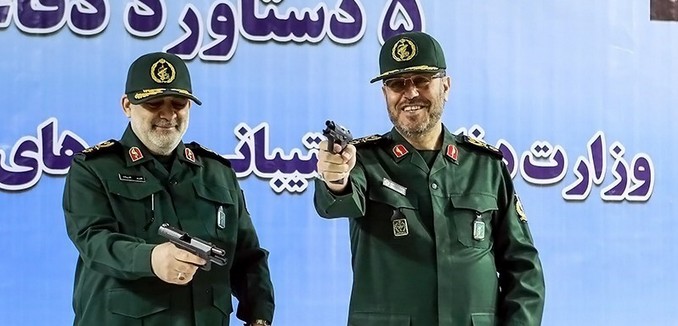Iran remained the “foremost state sponsor of terrorism in 2016,” the U.S. State Department announced in an annual report on global terrorism released this week. Iran was first designated a state sponsor of terrorism in 1984.
Militant Islamist groups supported by Iran, including Lebanon-based Hezbollah, continue “to threaten U.S. allies and interests,” and—along with Iran’s Islamic Revolutionary Guard Corps, “play a destabilizing role in military conflicts in Iraq, Syria, and Yemen.”
In 2016, “Iran continued to recruit fighters from across the region to join Iranian affiliated Shia militia forces engaged in conflicts in Syria and Iraq, and has even offered a path to citizenship for those who heed this call,” the report explained.
“Hizballah continued to work closely with Iran in these conflict zones, playing a major role in supporting the Syria government’s efforts to maintain control and territory, and providing training and a range of other support for Iranian aligned groups in Iraq, Syria, and Yemen,” it continued. “Additionally, Hizballah continued to develop its long-term attack capabilities and infrastructure around the world.”
Iran has also refused to identify and bring to justice senior members of Al Qaeda who are in its custody, and since at least 2009 has “allowed AQ facilitators to operate a core facilitation pipeline through the country, enabling AQ to move funds and fighters to South Asia and Syria,” according to the report.
The Islamic Republic also backs “Iraqi Shia terrorist groups,” such as Kata’ib Hezbollah, which support the regime of Bashar al-Assad in Syria and have been accused of committing “serious human rights abuses against primarily Sunni civilians.” It has also been known to sponsor Palestinian terrorist groups including Hamas, Palestine Islamic Jihad, and the Popular Front for the Liberation of Palestine-General Command, which have carried out lethal attacks in Israel and Egypt’s Sinai Peninsula, the report noted.
Iran also “provided weapons, funding, and training” to Shiite militant groups in Bahrain. In January of last year, for example, Bahrain announced that it broke up a terrorist cell backed by the IRGC.
Consistent with the charges in the State Department’s latest report, Toby Dershowitz and Gardner Lange of the Foundation for Defense of Democracies observed earlier this week that Iran is protecting suspects in the deadly 1994 bombing of the AMIA Jewish community center in Buenos Aires.
Last week, Iranian Deputy Foreign Minister Abbas Araghchi sought to reach an agreement with Interpol over five outstanding red notices—roughly the equivalent of arrest warrants—issued against high-ranking Iranian officials for their involvement in the attack, Dershowitz and Lange reported. Iran offering help to Interpol to find the bombers, they wrote, “is analogous to the arsonist volunteering to work with the police to find the source of the fire.”
More likely, Iran is looking for a way to get the red notices lifted, as it tried to do in 2013 when it signed a Memorandum of Understanding (MOU) with Argentina’s then-Cristina Kirchner government “to jointly ‘investigate’ the bombing. It was widely regarded as a scheme to whitewash the role of the red notice holders and accuse imaginary suspects, reportedly in exchange for favorable trade terms and perhaps other incentives. An Argentine court found the MOU to be unconstitutional,” Dershowitz and Lange wrote.
Because red notices are renewable every 10 years, and the notices for the Iranian officials were issued in 2007, they will be discussed at Interpol’s 2017 meeting later this year in Beijing.
“Those concerned not only about long-awaited justice in Argentina but also about Iran’s malign behavior in their own backyards, should insist that Interpol not yield to Iran’s pressure to remove the AMIA red notices,” Dershowitz and Lange recommended. “They should ensure that these notices are renewed and strictly enforced — with no mitigating caveats — lest Iran not be held to account for its role in the murder of the 85 victims of the AMIA bombing and feel free to mount similar future attacks with impunity.”
[Photo: Tasnim News]




